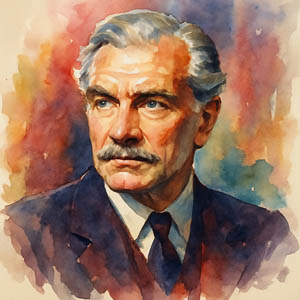— Laurence Olivier
 On this day in 1962, English actor, producer, and director Lord Laurence Kerr Olivier (1907–1989) founded the Royal National Theatre in London, serving as its first artistic director. His vision forever transformed the stage, lifting British theatre into bold new heights.
On this day in 1962, English actor, producer, and director Lord Laurence Kerr Olivier (1907–1989) founded the Royal National Theatre in London, serving as its first artistic director. His vision forever transformed the stage, lifting British theatre into bold new heights.
"The actor should be able to create the universe in the palm of his hand," he once declared—and few ever did it more masterfully than Olivier.
Known for fierce commitment and excellence in countless Shakespearean roles, he ignited the stage as MacBeth (1955), ruled with cunning as Richard III (1944), and plunged the depths of humanity as Hamlet (1948), a performance that earned him an Academy Award. From brooding Heathcliff in Wuthering Heights (1939) to the chilling Dr. Szell in Marathon Man (1976), Olivier embodied every emotion, every edge.
"Acting is illusion, as much illusion as magic is, and not so much a matter of being real," he explained. "I have to act to live." With every role, he breathed life into the craft—and made us believe in something bigger.
His storied marriage to actress Vivien Leigh, “the cat who hypnotized the king,” was both magnetic and stormy. “Use your weaknesses; aspire to the strength,” he once said—a truth he carried into his final years, even as he battled cancer and declining health.
In a 1978 Los Angeles Times interview, Olivier offered this reflection: “Living is strife and torment, disappointment and love and sacrifice, golden sunsets and black storms. I said that some time ago, and today I do not think I would add one word.” His voice, like his art, still echoes.
 Be passionate about your craft. Live larger than life.🎬💫
Be passionate about your craft. Live larger than life.🎬💫
